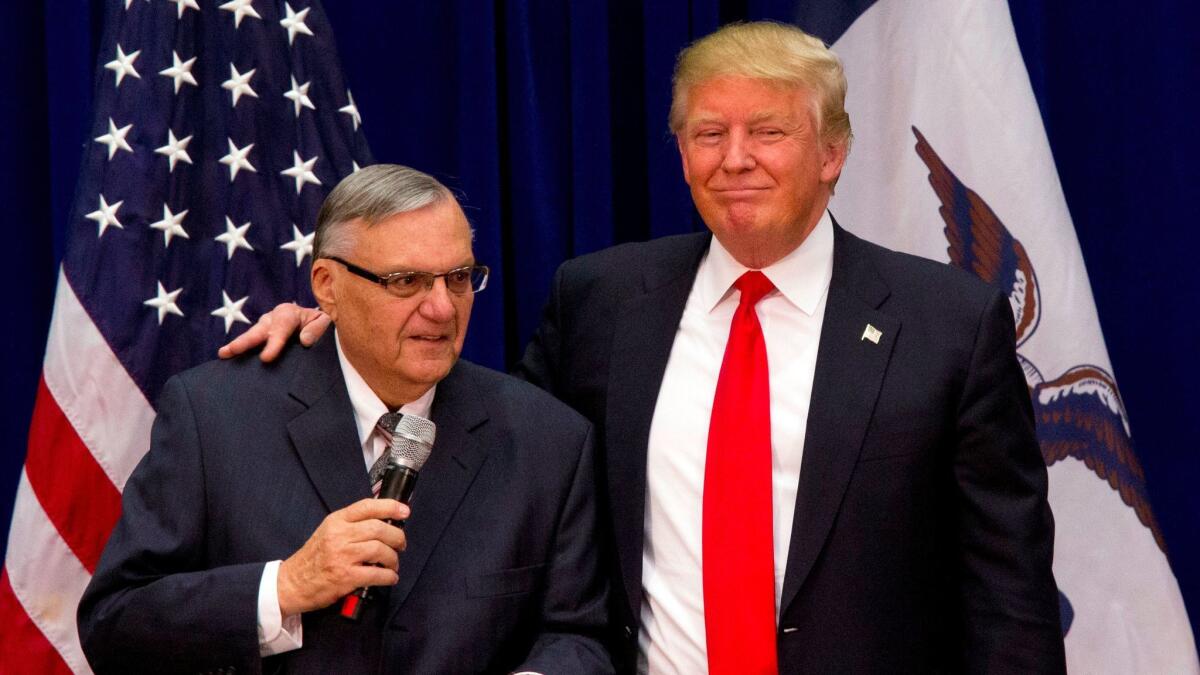Editorial: If Trump pardons Arpaio, he’ll reward defiance of the courts, and that’s wrong

President Trump hinted Tuesday night that he planned to pardon former Arizona Sheriff Joseph Arpaio for his federal contempt of court conviction, telling a crowd in Phoenix: “I’ll make a prediction: I think he’s going to be just fine. But I won’t do it tonight because I don’t want to cause any controversy. … But Sheriff Joe can feel good.”
If Trump can be believed — never a sure thing — and he makes good on that semi-veiled promise, he won’t be delivering a gift of mercy to a deserving and repentant offender. He’ll be rewarding a political friend and supporter who shares his abhorrence of illegal immigration and his affection for draconian enforcement strategies. By blessing a top local law enforcement officer’s defiance of a federal judge, Trump would again exhibit his own contempt for the courts.
Arpaio, 85, made himself a hero of the anti-immigrant right by cracking down on people living illegally in Maricopa County, which includes Phoenix. But his practices smelled of 1930s Alabama. He reintroduced the chain gang and forced inmates to live in a tent city under the hot desert sun, where critics complained deputies routinely used racial epithets in dealing with minorities, particularly Latinos, and some inmates died at deputies’ hands. He was sued a decade ago over complaints that his department routinely violated the rights of Latinos — including many who were citizens of the U.S. or living in the country perfectly legally — by stopping them based on racial profiling. Those who were suspected of living here without permission were detained, even though being in the country illegally is not a state crime. A federal judge ordered Arpaio to put a stop to the practice, but he did not.
The message Trump really sends here is that the president of the United States doesn’t think court orders need to be respected.
The Maricopa department’s atrocious treatment of those in custody — with or without a legal right to live here — contributed to Arpaio’s failure to win a seventh term as sheriff last November. Some people who take a hard line against illegal immigration might have appreciated Arpaio’s actions, but civil libertarians — and, really, anyone with a heart — were appalled, and rightly so.
In the end, the sheriff was convicted not of detaining people without legal cause, but of willfully disobeying federal court orders to stop the practice. (He could be sentenced to as much as six months in jail at his September sentencing hearing). That’s no split hair. The authority of the court system is predicated upon people respecting its orders and decisions. For an elected sheriff to decide that he need not heed a court order is unacceptable, both as a matter of law and as an example for others. If a sheriff can ignore a federal judge, why shouldn’t the rest of us do so as well?
Trump continues to prove that he is incapable of understanding nuance, or of looking beyond his own small stable of ideas, beliefs and allies. And by yoking himself to Arpaio, he’s not endorsing a rigorous or even effective approach to illegal immigration, but repudiating basic values of human decency and smart, contemporary approaches to criminal justice. He’s telling America that it’s permissible for the government to violate our basic civil rights simply because a sheriff wraps a “tough on crime” bow around it. A pardon suggests to other sheriffs around the nation that the administration will support them in any potential court showdowns over immigration.
But law enforcement officials cannot disregard court orders just because they — and the president — disagree with the policy at hand. And on a pragmatic level, illegal detentions, which violate the 4th Amendment, can lead to lawsuits and substantial civil damages that taxpayers ultimately have to cover — and for which there is no presidential pardon.
The message Trump would send is that the president of the United States doesn’t think courts need to be respected. From that perspective, and from ours, pardoning Arpaio would be just another shot by Trump at the court system, and at the institutions of our democracy.
Follow the Opinion section on Twitter @latimesopinion or Facebook
UPDATES:
12:25 p.m.: This article was updated with additional analysis and arguments.
This story was first published at 7:10 a.m.
More to Read
A cure for the common opinion
Get thought-provoking perspectives with our weekly newsletter.
You may occasionally receive promotional content from the Los Angeles Times.






